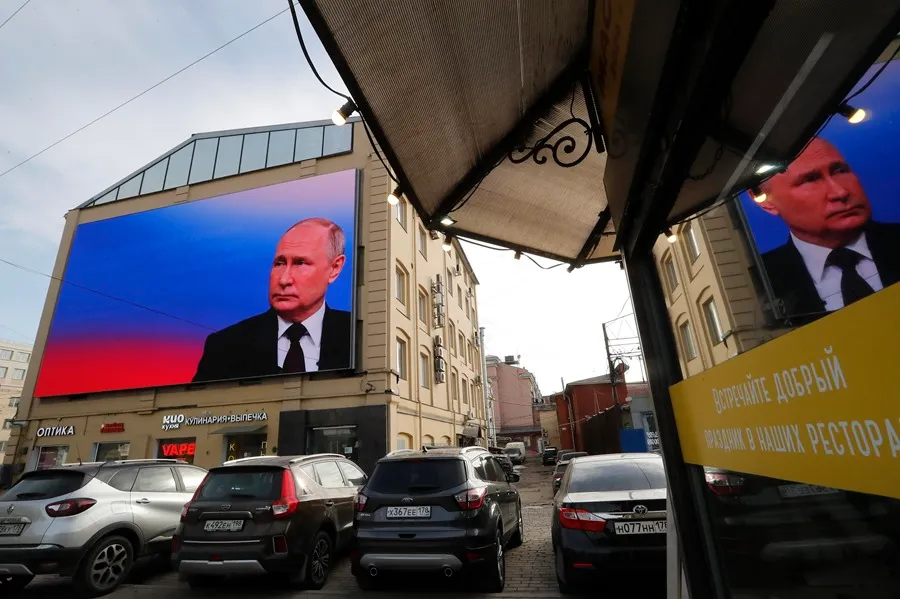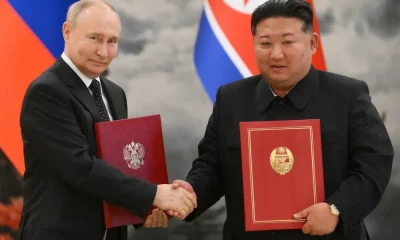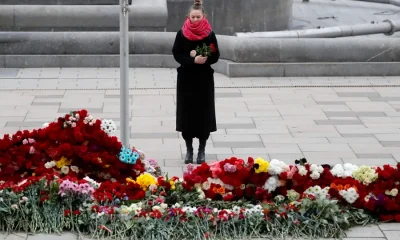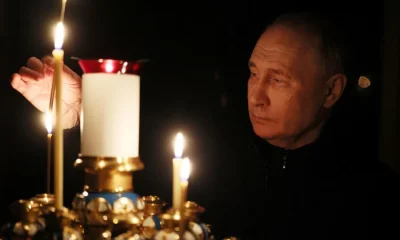International
Putin closes the electoral campaign with the aim of perpetuating himself in the Kremlin

Russian President Vladimir Putin closed the electoral campaign today with the clear objective of perpetuating another six years in the Kremlin, something more than likely, according to all the polls, while calls for the West not to recognize the results of the presidential elections increase.
“The world must assume once and for all that Putin is not who he appears. He is actually a usurper, a tyrant, a war criminal and a murderer,” said Yulia Naválnaya, widow of the late opposition leader, Alexéi Navalni, in an article published this week in The Washington Post.
The 112 million Russians called to the polls will be able to vote for three days – Friday, Saturday and Sunday -, an option introduced during the pandemic, which the opposition considers fraudulent, as well as electronic voting, which a third of the electorate will be able to exercise.
Putin addressed the Russians on Thursday on television to come and vote in elections that he described as a “step into the future” and stressed that the soldiers who fight in Ukraine “defending the homeland with courage and heroism and participating in the elections, give an example to all of us.”
Despite the fact that more than half of Russians advocate opening peace negotiations with Ukraine and the successes on the Ukrainian battlefield come with a eye-t-eater, Putin has a voting intention of more than 80%.
The presidential administration had informed the press that it was looking for a historic victory to support the Kremlin’s militaristic course and everything indicates that it will achieve it, since Putin had never won elections by more than 77% of the votes.
The Central Electoral Commission (CEC) only registered three candidates, none of them really opposition: the communist Nikolai Kharitonov and the candidate of the New People, Vladislav Davankov, who have a 6% voting intention, and the ultra-nationalist Leonid Slutski, who is listed as third in discord with 5%.
By reforming the clauses of the Constitution that prevented him from remaining in the Kremlin, Putin will be able to run for re-election again in 2030, by the time he will be 77 years old.
The president of the CEC, Ela Pamfílova, said today that “for the first time” the elections are held in “such a toxic international atmosphere” and accused Western countries of “an unprecedented cynical violation” of the right to vote of Russians residing abroad.
“This is not simply a president’s election, the destiny of Russia is at stake, what to do in the future. By the way, to a large extent (these elections) will determine how the world will develop. The transition from the unfair monopoly to equal relations between countries,” he proclaimed.
Pamfilova, who is accused by the opposition of manipulating the electoral results since she took office in 2016, said that these days the popular republics of Donetsk and Lugansk, and the Zaporiya and Kherson regions, will also vote, in reference to the four Ukrainian territories annexed by Russia.
Up to 4.5 million residents in the areas occupied by the Russian Army will be able to exercise their right to vote, even if they lack Russian citizenship, many of them have already voted in advance.
The highest moment of the campaign was the death of Navalni in prison – and for which the family and the West hold Putin responsible – but the Kremlin hopes that this factor will not stain his victory.
“I think they killed him. It was a premeditated decision. I think they did it with poison,” Guennadi Gudkov, a former Russian deputy exiled in Bulgaria, told EFE.
Gudkov, who worked in the Federal Security Service (FSB), believes that the authorities decided to take revenge on the opponent for “all the humiliations” to which he subjected them over the years with his allegations of corruption.
“The organizer was Putin,” said Gudkov, who recalled that the initial plan was for Navalni to never leave prison, but they changed their minds after admitting as a “great mistake” the pardon granted to the tycoon Mikhail Khodorkovsky in 2013.
For all these reasons, Navalnaya, the imprisoned opposition Vladimir Kara-Murzá and Gudkov address Western leaders, parliaments and societies with a single demand: that they do not recognize “totally falsified” elections, whose only objective is to “retain power.”
“The West should not recognize the results. Recognizing Putin as head of state after the elections will be a sign of weakness,” he said.
He assured that “there have never been such criminal elections in Russia,” since they take place when Russian troops violate international law and commit “war crimes” in Ukraine.
“We do not ask that the embassies be closed,” he said, adding that, at least, Western countries “should not recognize the elections as legitimate.”
International
A magnitude 6 earthquake shakes the province of Esmeraldas in Ecuador, bordering Colombia

A magnitude 6 earthquake was recorded this Friday in the coastal province of Esmeraldas, bordering Colombia, causing damage to several infrastructures and leaving, so far, 20 people injured.
According to the Geophysical Institute of the National Polytechnic School, the earthquake occurred at 06:44 local time (11:44 GMT) at 1.03 degrees south latitude and 79.69 degrees west longitude.
According to the source, the tremor occurred at a depth of 30 kilometers and 9.31 kilometers from Esmeraldas, capital of the homonymous province.
According to the National Secretariat of Risk Management (SNGR), the affected people had head injuries and bruises.
While the SNGR continues with the verification of affectations, it indicated that 80% of the electricity service and 80% of the telecommunications that were affected, are gradually restored.
Among the affected public buildings are the ECU 911 due to a fall of masonry; the Vargas Torres University, which has cracks; the Los Militares building where the front collapsed and the Prefecture building, among others.
The SNGR reported that the earthquake was felt with strong intensity in seven municipalities of the province of Esmeraldas and moderately in the provinces of Guayas and Manabí, while mildly in Carchi, Cotopaxi, Imbabura, Los Ríos, Pichincha, Santo Domingo de los Tsáchilas and Tungurahua.
About twenty minutes after the earthquake in Esmeraldas, one of magnitude 4.1 was reported in the coastal province of Guayas, located in the southeast of the country, without damage or victims having been reported so far.
The President of Ecuador, Daniel Noboa, ordered the displacement of all his ministers to Esmeraldas, in order to coordinate actions after the magnitude 6 earthquake recorded this Friday.
“I have arranged for the immediate deployment of all ministers in the province of Esmeraldas to coordinate the installation of shelters, delivery of humanitarian aid kits and assistance in everything our people need,” Noboa wrote on his social network account X.
The province of Esmeraldas was one of the most affected by the 7.8 magnitude earthquake recorded on April 16, 2016, which left more than 670 dead, thousands affected, as well as millions of material losses.
This earthquake also hit the province of Manabí, located, like Esmeraldas, on the coast of the Andean country, but also affected other areas and was felt strongly, even in the Ecuadorian capital.
Ecuador is located in the Pacific Ring of Fire or Belt, which concentrates some of the most important subduction areas (sinking of tectonic plates) in the world and is the scene of strong seismic activity.
In addition to Ecuador, the Horseshoe-shaped Belt comprises a large number of countries such as Chile, Argentina, Bolivia, Peru, Colombia, Panama, Costa Rica, Nicaragua, El Salvador, Honduras, Guatemala, Mexico, the United States and Canada.
International
Preparations for Pope Francis’ funeral, in figures

The funeral of Pope Francis this Saturday, the first of a reigning pontiff for two decades, is an event that moves dizzying figures and will require the full mobilization of Italian authorities and volunteers.
These are some of the figures that draw what can be expected tomorrow for a historic day:
The Italian Ministry of the Interior has calculated that 200,000 faithful will attend the funeral of Francis. For the next conclave – with a date yet to be defined – and the election of the new pope, that figure amounts to 250,000.
The funeral procession that will move the remains of the late pope from St. Peter’s Vatican to the Basilica of Santa María la Mayor, where Francis arranged to be buried in a simple tomb.
3,000 volunteers will mobilize the Italian Civil Protection, responsible for the management of the preparations. There will be 55 health teams distributed throughout the funeral procession between San Pedro del Vaticano and the basilica de Santa María la Mayor, in addition to 11 advanced medical posts and 52 additional ambulances that will join the existing fleet.
17 degrees and a radiant sun are expected at 10:00 (08.00 GMT) on Saturday, the start time of the funeral, although the thermometer could reach 24 degrees throughout the day.
The state group Ferrovie dello Stato makes 260,000 seats available to those who wish to approach Rome by train. Civil Protection also confirmed that 500 parking spaces for buses and coaches have been reserved for the same day in Rome and its surroundings.
130 international delegations have already confirmed their presence at the event, but it is expected that the final figure may rise to 170. Fifty will be headed by heads of state or government, including a dozen sovereigns.
120,000 arrivals planned in Rome on April 25 and 26, which will translate into about 320,000 overnight stays, according to figures from the Department of Tourism of the Italian capital, which warns that the estimates may be below even those that finally occur. 101,000 of those arrivals will take place in hotels and another 53,000 in “supplementary establishments”.
11,000 soldiers and members of the security forces, not counting the teams of the international delegations, who will ensure that the funeral is held without incident. Police, police officers and traffic officers will join at least 1,500 soldiers.
5 anti-drone bazooas, capable of intercepting the radio frequencies with which these devices are operated, which will reinforce the decreed no-fly zone over the Roman sky.
International
“A dignified life” for migrants, the plea in Panama in memory of Pope Francis

Catholics who work with some of the 299 migrants deported by the United States to Panama, beg the Government that beyond placing the flag at half-mast for the death of Pope Francis this week, it should pay tribute to him by giving “a dignified life” to the migrants, as the Supreme Pontiff preached.
“Never forget your human dignity,” because “you are not a discard,” the pope wrote last year in a message addressed to the thousands of migrants who had just crossed the dangerous Darién jungle, the natural border between Colombia and Panama, on their way to the United States.
Known by many as “the pope of migrants” for his defense of those who are forced to leave their land in search of better living conditions, he himself recalled then that he was “son of migrants who went out in search of a better future,” and that “there were times when they were left with nothing, until they went hungry; with empty hands, but their hearts full of hope.”
Therefore, members of Catholic organizations that are part of the CLAMOR Network (the Latin American and Caribbean Ecclesiastical Network for Migration, Displacement, Refuge and Trafficking in Persons), and who work with dozens of migrants in the Panamanian capital deported by the United States, remember the teachings of Pope Francis.
Elías Cornejo, coordinator of social promotion and attention to the migrant population of the Catholic organization Fe y Alegría, which is part of the Clamor Network, explained to EFE in a migrant shelter that we must “look for alternatives for these people, they cannot be kept in conditions that are not favorable or dignified.”
“In the context of the death of Pope Francis, who was incisive in insisting on humane treatment of migrants, I believe that this country that declares itself mostly Catholic (…) beyond the flag at half-mast, I would also ask the national government to dignify that memory of Pope Francis by giving an answer to many people who (…) have the right to have a dignified life,” Cornejo stressed.
“Give them that, try to find a human, Christian, evangelical answer,” he insisted.
The pilgrimage of this group of migrants through Panama began in mid-February, when a total of 299 arrived on three planes from the United States within the framework of an agreement that turned the Central American nation into a “joup” country for their repatriation.
Coming from extracontinental nations such as China, Afghanistan, Sri Lanka, Vietnam, Uzbekistan, Cameroon, Ethiopia, Iran, Russia, Pakistan or Nepal, 188 returned to their countries “voluntarily”, according to the latest official information available, and 111 refused to do so, many of them fearing for their lives.
The entire group was first housed in a central hotel in the Panamanian capital, and those who refused to be repatriated to their countries were transferred to a shelter more than 200 kilometers away, near the Darién jungle.
Then, after the decision last March by the Government of Panama to grant them a temporary humanitarian permit for 30 days, extendable up to 90, to find a way out of their situation, they took them back to the capital, although now without any type of logistical support, so the CLAMOR Network occupied that vacuum by first hosting the migrants in a humble hotel in the city, to transfer them days later to one of its shelters.
According to Cornejo, who underlines the support they receive in the shelter of “non-believing people, believing people, Muslim people, people of other religions too,” of the 69 migrants who moved there – families with children continue to stay in a hotel – 47 remain, since they “make their own decisions and move” by their own decision to other places.
“We don’t know where, we have an idea, but we don’t want to keep them or force them to anything, because they are free, they are not people who are imprisoned (…) We don’t want to pressure them, we don’t want to pressure the Government, but we do want to tell them again, ‘please, let’s find a way out of this’. An exit that has to be worthy for the State and for them, for migrants,” he remarked.
At least, he says, from the Foreign Ministry they have guaranteed that they will not deport anyone by force if the new 60-day period ends, an extension that ends in June and that, according to official data shared with EFE, at least 80 migrants have requested.
Two mothers from Asian countries who requested with their children the extension of the “temporary resident permit for humanitarian reasons”, as indicated in the document to which EFE had access, and who asked for anonymity, insisted that returning to their country is not an option, since if they return their “lives are in danger”.
Housed in a humble hotel in the center of the Panamanian capital, on a floor where behind each door there is a family of different nationality, they explain to EFE through a translation application part of their journey to the United States, crossing several countries of America with their minor children, and then their sudden expulsion without knowing the destination, some handcuffed hand and foot.
“When they put me on the plane I felt suffocated. His hands and feet were cold. My heart was beating fast, I had high blood pressure. I told the military,” recalls one of them. There were men and women handcuffed, the children were terrified. They are adults, but children are not, “how can they treat them as criminals?”
Now, they say, they are “afraid” that the day will come when the deadline they were given to stay in Panama will expire. “When this document ends, I don’t know exactly what will happen to us if the United States doesn’t get us out of here.”
“We want to ask Donald Trump to return us to the United States, please,” they begged.
-

 Central America5 days ago
Central America5 days agoCardinal Rodríguez to Attend Funeral of Pope Francis: “He Was Very Dear to Me”
-

 Central America5 days ago
Central America5 days agoNicaragua’s Ortega and Murillo Mourn Pope Francis, Acknowledge ‘Difficult’ Relationship
-

 International5 days ago
International5 days agoDominican Republic Declares Three Days of Mourning for Pope Francis
-

 International5 days ago
International5 days agoDHS Secretary Kristi Noem’s Purse Stolen in D.C. Restaurant Heist
-

 International4 days ago
International4 days agoPope Francis and Trump, a relationship of disagreements marked by migration
-

 International3 days ago
International3 days agoFrom the transfer of the coffin to the funeral, three days to say goodbye to Pope Francis
-

 International4 days ago
International4 days agoWithin Francis’ private wake: respect and prayer for the deceased pope
-

 International5 days ago
International5 days agoPope Francis: The Quiet Architect Behind the U.S.-Cuba Thaw
-

 International4 days ago
International4 days agoTrump’s emissary will visit Russia this week for consultations on the arrangement in Ukraine
-

 International3 days ago
International3 days agoA very heterogeneous and divided conclave will elect the new pope
-

 International3 days ago
International3 days agoModi returns to India and shortens his visit to Saudi Arabia after a deadly attack in Kashmir
-

 International4 days ago
International4 days agoCardinal Becciu’s enigma: will he enter the conclave?
-

 International4 days ago
International4 days agoThe pope last called the Gaza parish on Saturday and asked about the children
-

 International4 days ago
International4 days agoA candidate for the Supreme Court denounces an unequal dispute in the judicial election of Mexico
-

 International4 days ago
International4 days agoAmerican universities and colleges sign a letter against Trump’s policy
-

 International4 days ago
International4 days agoThe Government of Colombia presents twelve questions that it will propose in a popular consultation to promote its reforms
-

 International19 hours ago
International19 hours ago“A dignified life” for migrants, the plea in Panama in memory of Pope Francis
-

 International4 days ago
International4 days agoBurma’s military junta extends ceasefire until April 30 due to the earthquake
-

 International2 days ago
International2 days agoThe Arab League supports Hamas handing over control of Gaza and weapons to the Palestinian Authority
-

 International3 days ago
International3 days agoEl Salvador formalizes the proposal for the exchange of Venezuelan deportees, according to Bukele
-

 International2 days ago
International2 days agoThe Pope’s funeral procession through the center of Rome worries the Italian authorities
-

 International3 days ago
International3 days agoThe Peruvian Public Ministry denounces the former attorney general for an alleged corruption case
-

 International4 days ago
International4 days agoRoyal quinoa, the superfood that grows in front of the largest salt flat in the world in Bolivia
-

 International4 days ago
International4 days agoInternational leaders begin to confirm their presence at Pope Francis’ funeral
-

 International3 days ago
International3 days agoMaradona’s house arrest is again a focus of tension in the trial for his death
-

 International19 hours ago
International19 hours agoA Russian general dies in the explosion of a car bomb near Moscow
-

 International3 days ago
International3 days agoA judge orders the Trump Government to restore Voice of America services
-

 International3 days ago
International3 days agoDonald Trump will visit Saudi Arabia, Qatar and the United Arab Emirates in mid-May
-

 International4 days ago
International4 days agoChurch charges ceased or resigned in the papacy of Francis for cases of pedophilia
-

 International3 days ago
International3 days agoThe president of the World Bank underlines his intention to lift his veto on nuclear energy
-

 International2 days ago
International2 days agoMigrants want to stay on Mexico’s southern border because of Sheinbaum’s industrial plan
-

 International2 days ago
International2 days agoA group of the poor and a delegation of migrants will participate in the funeral and burial of the pope on Saturday
-

 International19 hours ago
International19 hours agoA magnitude 6 earthquake shakes the province of Esmeraldas in Ecuador, bordering Colombia
-

 International2 days ago
International2 days agoThe pope’s doctor reveals his last moments of life and that he wanted to “die at home”
-

 International3 days ago
International3 days agoMarco Rubio reorganizes the State Department to eliminate offices and jobs
-

 International2 days ago
International2 days agoFrom email to marriage: the day Pope Francis married a Uruguayan couple
-

 International3 days ago
International3 days agoThe Brazilian Supreme Court opens trial against six others accused of leading the coup attempt
-

 International19 hours ago
International19 hours agoPope Francis’ funeral procession will be a six-kilometer journey through the heart of Rome
-

 International19 hours ago
International19 hours agoPutin and Witkoff address possible direct negotiations between Russia and Ukraine
-

 International3 days ago
International3 days agoA judge in the United States stops the deportation to El Salvador of a hundred Venezuelans
























